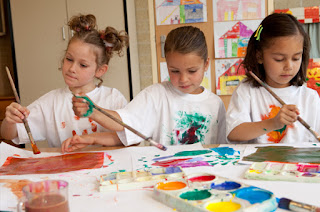Theatre Thoughts: Bacc Creativity
It was with some trepidation that I watched the announcement of Karen Bradley as Secretary of State for Culture and Media: her background is in tax and financial consultancy, and I wondered whether she would look at the arts simply in economic terms (culture is worth around £84billion to the UK economy each year).
She came into the role at a time of unprecedented political turmoil, and something that unfortunately slipped under the radar was the EBacc protest outside the Houses of Parliament on the 4th July, and Parliament's subsequent debate on the inclusion of the proposed exclusion of arts and creative subjects from the new curriculum.
She came into the role at a time of unprecedented political turmoil, and something that unfortunately slipped under the radar was the EBacc protest outside the Houses of Parliament on the 4th July, and Parliament's subsequent debate on the inclusion of the proposed exclusion of arts and creative subjects from the new curriculum.
Image Source: sheknows.com
The EBacc debate is rumbling on, and greater voices and minds than mine are continuing to argue for the importance of access to the arts and creative subjects.
Karen Bradley is overseeing the launch of a new creative initiative announced in March; the Cultural Citizens, intended to provide access for children to the arts and cultural institutions. This, in many respects, is wonderful;
By providing access to the arts outside of schools and education automatically makes it something that is fun, something to be enjoyed rather than studied, and I believe that arts schemes aimed at children mean that they develop a love of the arts and culture which will stay with them throughout their lives.
The Cultural Citizens programme is initially being piloted in areas that, while rich in heritage, have traditionally lower levels of engagement with the arts, including Blackpool and Barking, and in areas that are diverse: the Warwick Report found that audiences for cultural activities are highly unrepresentative of communities as a whole. Hopefully this will go some way to redressing this imbalance.
Image Source: theguardian.com
However, I still have a few misgivings. Mainly that if the arts are removed from the curriculum and become something that is seen as a hobby, does it make careers in the arts seem less lucrative, or less possible? There has already been a massive drop in the uptake of arts subjects at GCSE level and beyond. I fear that we could be heading for an arts drought as less and less students pursue cultural careers.
I would argue that the arts are to be enjoyed and studied. In tandem. The new requirements for those studying Drama, that they don't actually have to go and see a live performance, baffle me. I understand that it is supposed to make the subject more accessible and less expensive, but surely there are ways around this? Subsidised theatre trips, or building links with local theatres or theatre groups, inviting touring groups to perform at the school. Just a couple of ideas thrown off the top of my head there.
Image Source: actoninfo.com
The arts and culture can't simply be measured in monetary terms. Why else would there be hundreds of art, drama and music therapy institutions? The act of being involved with creativity improves well-being, which has a knock on effect to local health budgets. Cities and towns with high levels of arts engagement have lower levels of crime and anti-social behaviour. Children engaged with culture have higher self-esteem and have traditionally performed better in other, non-arts subjects.
I get that they're seen as soft-subjects, and when I was taking my GCSE's, students who performed less well academically were encouraged to take Drama as a subject. But at least they had that option. Under the new proposals, they won't even have that. And will the Cultural Citizens programme be compulsory or optional? Otherwise we risk preaching to the converted as so much of the arts is already wont to do.
It's a good idea, and I hope it works, but then I also hope that access to the arts in schools is preserved and promoted. The arts in this country are to be celebrated and protected; it's something we do so well! We need to ensure we're actively advancing the arts, and not make cultural engagement something that's optional or hard to find.






Comments
Post a Comment